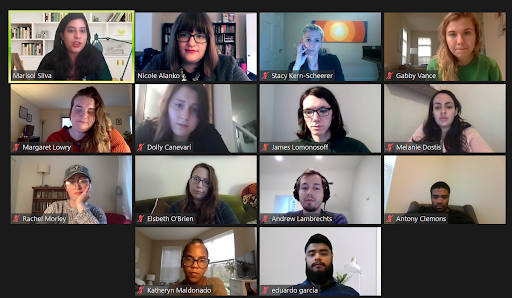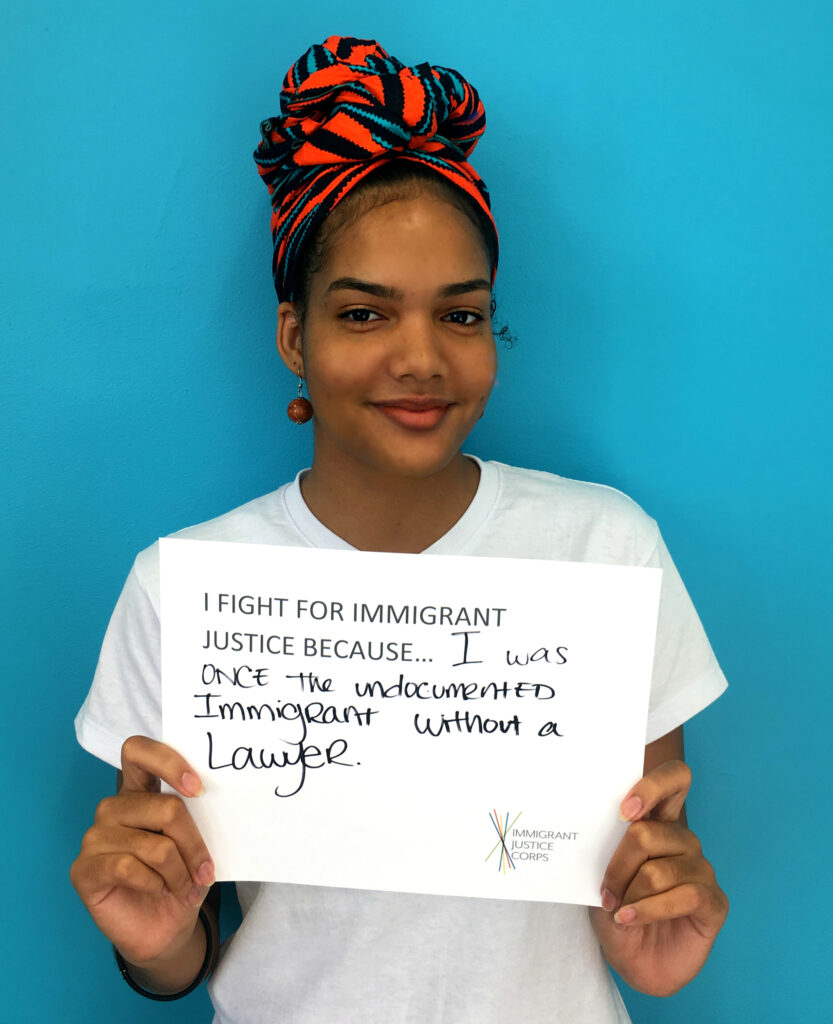7 Lessons I Would Tell Myself If I Was In Your Shoes
Recently, fourth-year IJC Justice Fellow Marisol Silva spoke to students in William & Mary Law School’s Immigration Clinic about her experience as a public interest attorney and as an IJC Fellow. The presentation was arranged by Nicole Alanko, who is currently a third-year Fellow at W&M’s Immigration Clinic. Both Marisol and Nicole were co-Fellows during their time as IJC Fellows at Safe Horizon.
“Marisol is such a natural fit to speak at our Clinic,” said Nicole. “She was such an incredible support for me when I started my fellowship, and I can’t imagine my time as an IJC Fellow without her. I’m so happy to give her the opportunity to share her insight about starting out in practice with our students.”
“Having Nicole as a co-fellow while at Safe Horizon made a huge difference for me, whether it was discussing the limitations of trauma-centered lawyering when working in structurally stacked “justice” systems or having a safe space to vent, she was my anchor,” said Marisol.
During the presentation, Marisol passed on the wisdom she’s gained over the last four years as an IJC Fellow:
7 Lessons I Would Tell Myself If I Was In Your Shoes…
Your journey is your own
Accept that your post-law school journey is going to look very different from what you thought it would be. A lot of us in the legal profession by nature are prone to wanting to have everything “under control.”
Your first couple years out of law school are such a transition period. You’re being thrown into the responsibilities of managing a large caseload, working through constantly changing laws and the dawning of huge responsibilities that have deep impacts on your clients’ lives. Before in law school, you had the comfort of having your cohort nearby (at last pre-COVID). It can be a very isolating experience to no longer have your cohort.
My first couple years of law school have taught me that I have to embrace my own journey- regardless of how “messy” it can feel. For example while I was a Justice Fellow at Safe Horizon I found out I failed the bar exam in October 2017, and started studying while working full-time. While I was able to take a few weeks off before the exam and had a supportive supervisor, the reality was that I felt overwhelmed. After retaking the bar exam, I failed the second time and found out in April 2018. While I committed myself to studying for the third time, I felt like I was veering off the path I had set out for myself. While I passed my third time taking the bar exam, I had to learn how to embrace my own process and journey, even if it wasn’t what I had imagined it to be.
You’re already the best attorney you could be right now.
Imposter syndrome is real and won’t magically vanish once you graduate law school, or start your first post-grad job, or even be sworn into the bar. The realization that I learned is that no license, law degree, or title will make you feel any more legitimate. As a woman of color, who also happens to be 5’1 and baby-faced, I am continuously underestimated by opposing counsel, by judges, and at times even by my own clients. There is no magic cure for imposter syndrome. I want to reassure you that you are already the best attorney you can be at the time of reading this article. And also a reminder to be gentle with yourself as you navigate feelings of imposter syndrome, and to question the systems in place that cause us to internalize feelings of self-doubt.

Expect the Unexpected
You have to learn to expect the unexpected. As my past supervising attorney at Immigrant Justice Corps, Harold Solis told me, “you have to be comfortable with knowing that nothing will turn out the way you planned it on the day of a hearing.” I’ve learned that lesson the hard way. As someone who lives with anxiety, my natural urge is to try to avoid surprises at a hearing. I’ve learned that inevitably, a case will go very differently than what you think. Whether it be client testimony differing from what was prepped, or a judge dismissing your case theory and having to do a direct examination and opening statement on the fly. Learning to live in the space of uncertainty is difficult but the only way is to embrace it and acknowledge it as a rule.
“Stay Soft – It Looks Beautiful On You.”
I urge you to keep your heart soft and to actively seek out experiences that are beyond your work life as an attorney to keep your heart this way. What does it mean to keep a soft heart in a world where our clients are treated with cruelty? How do we hold the complexity of client experiences? These are questions that I am still trying to answer, but I believe in the strength of a soft heart as being one that allows you to see the world with clearer vision.
Reframe What Success Means For Your Client
Here’s the truth, in practicing public interest law, and especially immigration law, your traditional “wins” are few and sometimes far in between. You’ll need to reframe your vision of what “success” means. Focus on these questions instead: Did I help empower my client through my representation? How can I focus on my client’s needs and give them an amplifier to have their voice heard? Does my client feel that I was open and empathetic during my work together?
You Are A Human Before You Are A Lawyer. Take Care Of Your Humanity First.
I have learned that you have to actively do work on yourself to do this work. The impacts of vicarious trauma, potentially highlighting your own intergenerational trauma depending on your past, and identification if coming from an immigrant family is very real. Do what you need to do to preserve your humanity. As someone who has experienced vicarious trauma, I have learned that starting weekly therapy has changed my life for the better. I cannot imagine doing this work without being in therapy and having a supportive network of family and friends.
Accept That The Work You Are Doing Is That Of Many Lifetimes. You’re Not Here As A Savior.
The immigrant communities you serve are incredibly resilient and powerful despite our devastatingly unjust immigration system. You are not here to “save” anyone. Your clients don’t need to be saved. They need an advocate who amplifies their voices, not your own.
